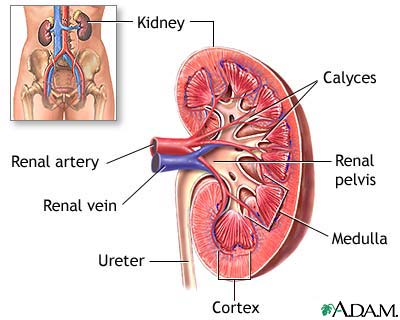Treatment
The goal of treatment is to reduce the inflammation. You may need to stay in a hospital to have acute nephritic syndrome diagnosed and treated. The cause must be identified and treated. Treatment may include antibiotics or other medications or therapies.
Your doctor may recommend bedrest. You may need to limit salt, fluids, and potassium in your diet. Your health care provider may prescribe medications to control high blood pressure. Corticosteroids or other anti-inflammatory medications may be used to reduce inflammation.
Other treatment of acute kidney failure may be appropriate.
Support Groups
For information and support, see kidney disease support groups.
Prognosis (Expectations)
The outlook depends on the disease causing the nephritis. When the condition improves, symptoms of fluid retention (such as swelling and cough) and high blood pressure may go away in 1 or 2 weeks. However, urine tests take months to return to normal.

Children tend to do better than adults and usually recover completely. Only rarely do they develop complications or progress to chronic glomerulonephritis.
Adults do not recover as well or as quickly as children. Although it is unusual for the disease to return, at least one-third of adults whose acute nephritic syndrome does return will eventually develop end-stage kidney disease.
Complications
* Congestive heart failure
* Pulmonary edema
* Chronic glomerulonephritis
* Nephrotic syndrome
Calling Your Health Care Provider
Call your health care provider if you have symptoms of acute nephritic syndrome.
Acute pancreatitis: Overview, Causes
Acute pancreatitis: Symptoms & Signs, Diagnosis & Tests
Acute nephritic syndrome : Treatment
Reviewed By : Parul Patel, MD, Private practice specializing in Nephrology and Kidney and Pancreas Transplantation, California Pacific Medical Center, San Francisco, CA. Review provided by VeriMed Healthcare Network. Also reviewed by David Zieve, MD, MHA, Medical Director, A.D.A.M., Inc.
